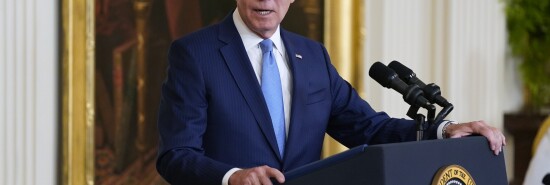
At G-7, Biden must underline urgency of China concern
Washington Examiner
Video Embed
President Joe Biden is meeting G-7 leaders in Hiroshima from Friday to Sunday. The White House and hosting Japanese Prime Minister Fumio Kishida have made it clear that China is at the top of the agenda.
That focus on China is not sufficient, however.
BIDEN’S STANDING QUESTIONED AS HE ARRIVES IN JAPAN FOR G-7
If this summit is to be effective in meeting the increasingly grave challenge China poses to international security, Biden must make clear to his counterparts that America expects its allies to join it in resolutely drawing a red line around Taiwan and making it clear to Beijing that any effort conquer the island democracy would be met with sustained economic retaliation at least.
Canada, the European Union, France, Germany, Italy, and the United Kingdom may reject this demand for a new toughness — they are democracies and must serve what they deem to be the interests of their people — but the stakes are now too high and urgent to rely on patient diplomacy. Most U.S. military analysts believe China will attack Taiwan before the end of this decade. Biden should thus make clear that the U.S. will judge its allies by the level of their commitment to joint action.
This shouldn’t be complicated.
Japan’s G-7 website notes that the summit centers on “upholding the international order based on the rule of law” and “firmly rejecting any unilateral attempt to change the status quo by force or the threat to use nuclear weapons, as Russia has done, or the use of nuclear weapons.”
That is a clear reference to China’s threatened invasion of Taiwan. Unfortunately, while the U.S. and Japan are committed to defending that cornerstone of international order, other G-7 nations are havering. As with Canada and the U.K., the EU’s two executive leaders, Ursula von der Leyen and Charles Michel, only tentatively support Taiwan. Their willingness to take coercive action to defend the status quo is unclear. France and Germany are even worse, particularly France.
Last month President Emmanuel Macron said he believes Europe should avoid the Taiwan issue entirely. He told Politico during a state visit to China, “Europeans cannot resolve the crisis in Ukraine. How can we credibly say on Taiwan, ‘Watch out. If you do something wrong, we will be there’? If you really want to increase tensions, that’s the way to do it.”
This was Macron making a play for Xi Jinping’s favor but making it sound like realistic statecraft. France’s navy is capable of action anywhere in the world, especially if it were to use its submarines alongside the U.S. and other allies. But Macron instead took the weak, appeasing path of pretending it is unfeasible even to keep Beijing guessing. That wins Xi’s immediate favor by diluting U.S. efforts to show that Taiwan is of global concern. In return, Macron gets lucrative trade and investment deals from Beijing.
Xi’s strategy is to divide the West by using trade as a wedge. He wants to dismantle the post-1945 democratic international order. He does not want democracy to create the rules, or trade to be conducted within the bounds of the law. Xi wants the Chinese Communist Party to decide or waive the rules as it chooses. He wants access to trade to be dependent on political submission to Beijing, and human rights and sovereign territory to exist only so far as Beijing wishes. In other words, a murderous tyranny would decide how the world runs.
That’s why Biden must do everything in his power to keep the current order in place.
But things do not look promising. Italian Prime Minister Giorgia Meloni has shown some courage, pushing back against China. But she fears overplaying her hand and provoking economic retaliation. Then there’s German Chancellor Olaf Scholz who, unlike his more courageous foreign minister Annalena Baerbock, adopts much the same approach as Macron. Even the U.K. and Canada are showing worrisome hesitation about joining the U.S. to confront China. Only this week, Prime Minister Rishi Sunak abandoned a pledge to ban Confucius Institutes in Britain, for example.
The U.S. must resist this ambivalence toward China by its allies. If China isolates the U.S. and Japan from the support of the rest of the world, Xi’s appetite for an invasion of Taiwan will grow. The Chinese leader most fears the destruction of China’s invasion fleet in the Taiwan Strait and systemic long-term sanctions that isolate China from international commerce.
CLICK HERE TO READ MORE FROM THE WASHINGTON EXAMINER
The need for greater allied unity doesn’t mean Biden must demand that allies commit to going to war over Taiwan. But it does mean he should let them understand that they can only be a close ally if they tell China they will punish it if it invades. Without that, the U.S. would stand alone in a devastating war launched against the West’s most defining value, democratic territorial sovereignty.
America’s allies have a choice. But America also has a choice of allies.
